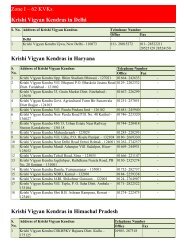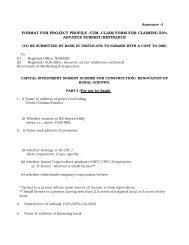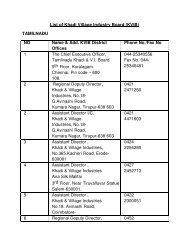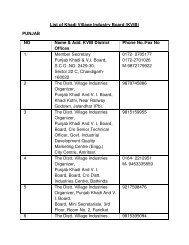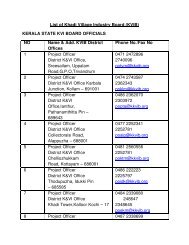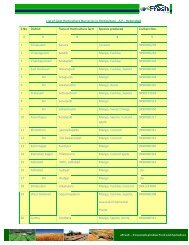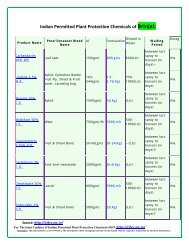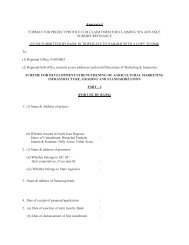Solar-powered sprayer that solves many problems ... - Efresh India
Solar-powered sprayer that solves many problems ... - Efresh India
Solar-powered sprayer that solves many problems ... - Efresh India
You also want an ePaper? Increase the reach of your titles
YUMPU automatically turns print PDFs into web optimized ePapers that Google loves.
<strong>Solar</strong>-<strong>powered</strong> <strong>sprayer</strong> <strong>that</strong> <strong>solves</strong> <strong>many</strong> <strong>problems</strong><br />
Once charged during the night it can be operated for nearly eight hours<br />
One need not be a genius to develop any<br />
commonly used devices. Take the case of<br />
the humble yet important knapsack<br />
manual <strong>sprayer</strong> (hung on the shoulders).<br />
Though <strong>many</strong> models are available on<br />
the shelves, priced at different rates,<br />
most of them last for only a few years.<br />
“Regularly filling them with water,<br />
pesticides and fuel (in case of fuel<br />
operated ones) makes it difficult to lift<br />
and hang them on the shoulder. After an hour of spraying, the weight of the machine creates a<br />
backache and shoulder pain for farmers,” says Mr. David Raja Beleau, Assistant Director of<br />
Horticulture Kadayam, Tamil Nadu, who developed a solar <strong>powered</strong> battery operated <strong>sprayer</strong> for<br />
farmers.<br />
Big effort<br />
In the commonly available ones, the user needs to exert a lot of effort to push the lever up and down<br />
to create the pressure to spray.<br />
Sometimes when the pressure becomes uneven, the nozzle gets blocked and the farmer has to spend<br />
time to rectify it.<br />
“Being a farmer and working among them for long years, I decided to make some alterations in the<br />
existing design and fitted solar panels and a battery unit to it.,” says Mr. David.<br />
An electric motor operated by a 12 volt 7 Amp rechargeable battery, powers the <strong>sprayer</strong> which has a<br />
capacity of 16 litres.<br />
Once charged during the night, it can be operated for nearly eight hours and there is no need for<br />
petrol or any other fuel to operate the device.<br />
While spraying in the field, the battery can be further charged by switching on the solar power<br />
system attached to the <strong>sprayer</strong>.<br />
The solar panel is attached to a helmet and connected to the battery.
Minimizes drudgery:<br />
“The <strong>sprayer</strong> not only minimizes the drudgery of the work but is also more effective than the<br />
conventional ones.<br />
“Since villages still get electricity for a short time, <strong>that</strong> too during odd hours, this solar <strong>sprayer</strong> just<br />
might be the answer,” explains Mr. David.<br />
The solar power system in the <strong>sprayer</strong> can also facilitate lighting of ‘wireless light traps' <strong>that</strong> control<br />
insect pests and reduces the number of insecticide sprays by fifty per cent, cutting the cost of<br />
cultivation for the farmer.<br />
This reduces pesticide residue in the products thereby improving the quality of the products. The<br />
light traps can also control mosquitoes effectively .<br />
While demonstrating to the farmers in Tirunelveli a farm labourer who gets hired by others for<br />
spraying said <strong>that</strong> it was just the equipment he dreamt of when the cost of fuel was increasing<br />
everyday.<br />
A woman farmer who bought the <strong>sprayer</strong> said ‘It is easy for me to carry the load on my back and<br />
spray easily on my jasmine crops.<br />
Seems like a boon:<br />
Another farmer from Kolli hills who came to see the demonstration of the device remarked <strong>that</strong>, “in a<br />
remote area like ours power failures are common occurrence. This device seems to be a boon for us.”<br />
“That the idea of converting existing battery <strong>powered</strong> knapsack equipment into solar <strong>powered</strong> one<br />
emerged because villages still did not have enough electricity to either run the <strong>sprayer</strong>s or to charge<br />
the batteries for any single spraying operation. The solar power system is priced at Rs. 3,500.<br />
Farmers can buy it and fit to the existing devices they use,” says Mr. David.<br />
Those who are interested can contact Mr.David Assistant Director of Horticulture Kadayam through<br />
his mobile number 9486285704 or microeconomicsdavid@yahoo.co.in<br />
Source: THE HINDU DATE: 29-12-11<br />
VISIT: http://www.thehindu.com/sci-tech/agriculture/article2755161.ece





